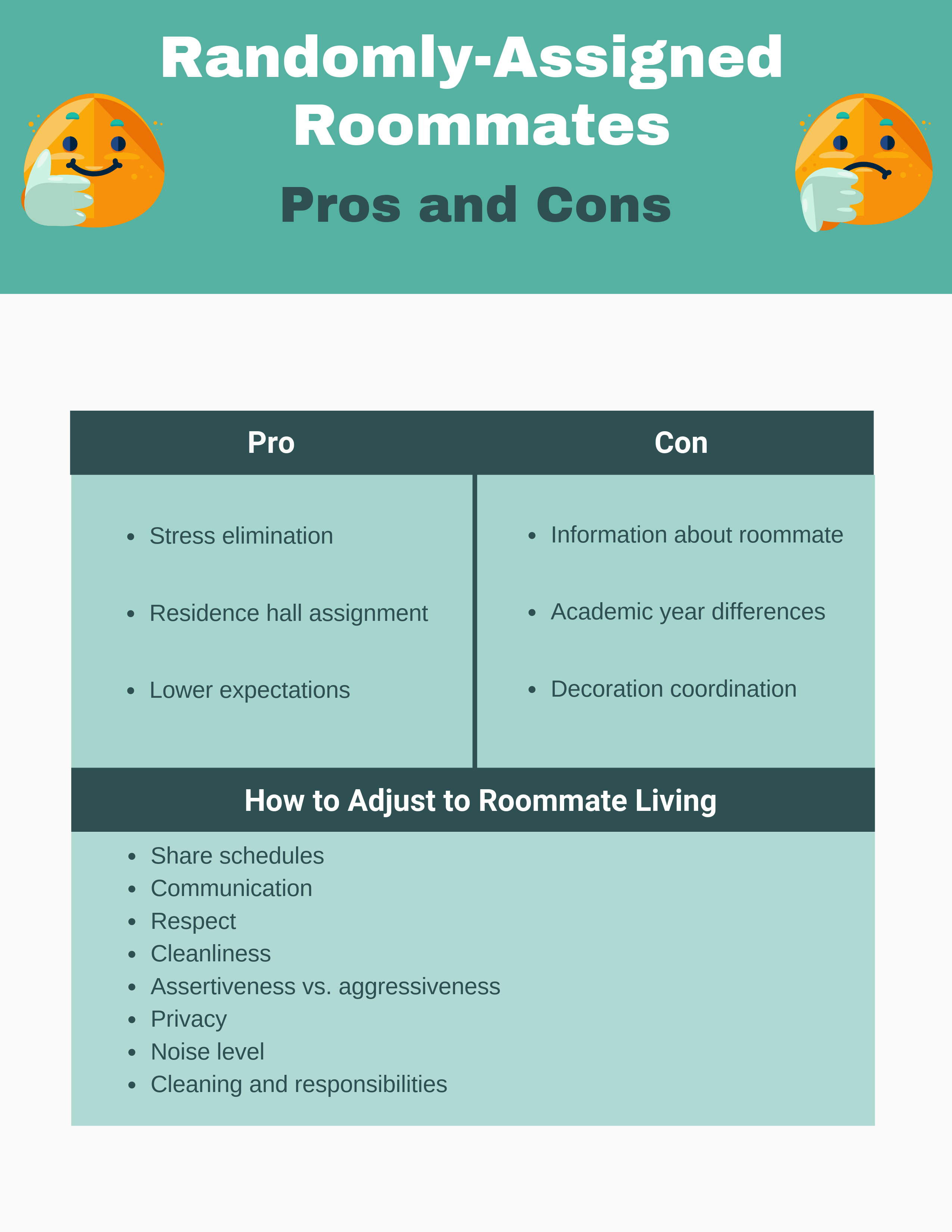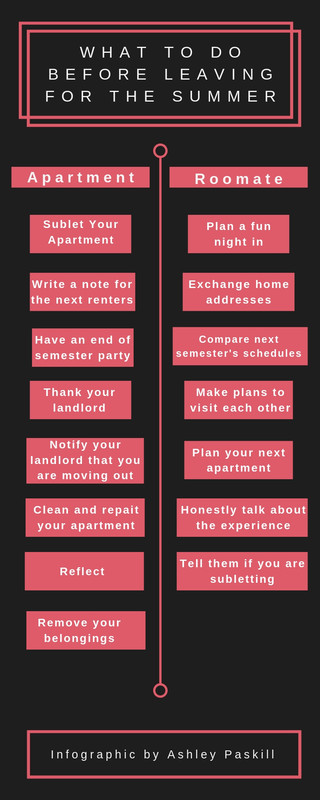College Roommate Tips
How to Decide to Live With Your Best Friend or Not
Figuring out who to live with for the duration of your academic year can be tough. On one hand, you don’t want to jump right in to living with someone random, but you also don’t want to spend forever searching for someone and let time waste. One option to consider is living with your best friend if they are around and are looking for a roommate as well.
Having your best friend as your roommate sounds like a dream, and sometimes it can be! However, there are a few things to consider and discuss beforehand to avoid a World War III-type disaster. Are you looking for a roommate? Thinking about asking your best friend to be your roommate? Be sure to read these four things to discuss with your bestie before moving in together!

Things to Discuss Beforehand:
- Having Guests Over: One important thing to discuss with your BFF before diving into being roommates is how each other feels about having guests over. You may be on the conservative side and not prefer to have guests over more than once a week, with appropriate notice. Your best friend, on the other hand, might be more open about inviting people over and enjoy doing so spontaneously. This is important to discuss as it pertains to you and your potential roommate’s comfortability with privacy. Krista Diamond of StorageFront.com writes, “Figure out what works for both of you when it comes to having significant others over, hosting parties and inviting family members to crash when they’re in town.”
- Cleanliness: A major point of contention for roommates, best friends or not, is cleanliness. Everyone has different lifestyle choices and how they do things, and this doesn’t exclude cleaning. You and your best friend obviously don’t live together (yet) so there would be no way for you to know if you could tolerate their level of cleanliness. You might be more on the laidback side and don’t worry about a few dishes in the sick, while your best friend might be a clean freak. Establishing each others levels of cleanliness is super important in establishing whether or not you two should move in together.
- Sharing Items: Some people love sharing every aspect of their possessions, whether it be shampoo or a bag of Cheetos. Another important thing to discuss with your best friend before moving in together is how you both are in terms of sharing things. You might not care about sharing all of your things with your best friend, even down to a pillow off your bed or your leftover pizza. Your friend might be more possessive about their things, and there’s nothing wrong with that! However, you and your potential roommate should be aware of these things that could cause a problem sometime in the future.
- Budget: One super important element about living with someone is figuring out how to split up living expenses like rent/amenities/cable & internet. Taking on adult responsibilities and figuring out how to effectively split bills can be difficult but it will definitely save you any kind of money-related trouble in the future. If your bestie likes to splurge on grub hub every day and is forgetful about paying bills on time, that would be something important to discuss before moving in together. Likewise, if you have trouble balancing payments, you should talk to your potential roomie about this. Leslie Tayne of Credit.com notes, “A major key for keeping the peace is making sure bills are organized. Figure out when and how bills will be collected and split each month, how they will be paid, and who is responsible for paying what amount. While this may sound obvious, too many times roommates will wait until the last minute, causing stress, tension and possibly late bills.”
How to Keep the Peace:
- Communicate: You have probably heard about keeping the doors of communication open over and over again in your life, but I can promise you that this is incredibly important, not only in roommate relationships but in all relationships- especially with your best friend. No matter what, you want to make sure that you and your best friend are communicating effectively. There is nothing worse than having a problem with your roommate, aka your closest friend, and just letting their actions get under your skin. It is infinitely more beneficial to confront your roommate with your problems than let the tension build for no reason.
- Schedule a Roommie Date: You and your potential roommate were best friends prior to moving in together, and it should stay that way while you’re living together. Between endless papers, labs, extracurricular activities, and jobs it’s hard to maintain a strong social life in college without driving yourself crazy! It’s especially hard to find time to actually hang out with your roommate because you’re so used to seeing them all the time. As a way to keep the vibes good in your living situation and stay close with your bestie, set up a day or night for you two to hang out.

Image via Pexels
Moving in with your best friend can be a blessing or a curse. Depending on how well you two get along and how well your lifestyle choices go together, you guys might thrive together or burn each other into the ground. Before moving in together, make sure to discuss important things like having guests over, cleanliness, sharing items an
The Pros & Cons of Getting a Randomly-Assigned College Roommate
By Amanda Cohen
Whether you’re a rising freshman, sophomore, junior, senior, and so on, you probably will encounter the following decision: choosing who to room with. There are so many different ways to go about deciding who you’re going to live with. You can shamelessly post a “get to know me” wall post in your university’s Facebook group, you can try to meet people during orientation (if you’re a freshman or transfer student), or you can choose to get randomly assigned a roommate.
I know it seems scary to leave your living situation in the hands of your university because it is scary, but it can also be pretty amazing to let your school handle it. However, I am going to try and see both sides of the situation by giving you the pros and cons of getting assigned a random college roommate. If you’re a rising freshman or a transfer student, make sure you pay close attention because this is most applicable to you since older college students already met people that they will want to room with. Read on if you want to make the decision as to whether or not you will get assigned a college roommate an easier and less stressful decision during an already tumultuous time.

Pro: You Eliminate the Stress of Having to Decide Between Roommates
Yes, making the decision of whether or not to have a random roommate is a hard decision, but it’s not as hard as having to choose between multiple roommate options that you meet online or during orientation. There are already so many decisions and emotions you have to work through when preparing to go to school, so why not eliminate choosing a roommate (or roommates) from the equation. If you are an already indecisive person (nothing to be ashamed of, I’m quite indecisive about many things), then leaving the fate of your roommate situation in your university’s hands instead of yours is the definition of ideal. I know plenty of people who have had success when being assigned a random roommate and they didn’t have to craft any funny posts on their social media!
Con: You Have Little to No Information About your New Roommate
Yes, this can happen with a roommate that you meet via. social media and/or orientation, but it’s much more likely to happen if your university matches you with a random roommate. Depending on the school you’re attending, you could get your roommate assignment on the early side or in August right before you move in. If you get your assignment on the later side, there is a good chance that you won’t get to know your roommate before you move in. Meeting a new roommate is awkward, especially during an already stressful time, so it’s not ideal that you will know little to nothing about your roommate’s life and personality until move-in day or right before. This can sometimes be a more stressful reality than having to choose your roommate yourself, but it really depends on your personality.
Pro: You Will Probably Get a Better Residence Hall Assignment
I can’t speak for every school, but at the University of Michigan, if you chose not to request a roommate, you were much more likely to stay off the dreaded North Campus (might as well be Antarctica). It may seem like no big deal, but requesting roommates is a hassle for the school because they have to plan everything to accommodate all of their incoming students, which can be in a number in the thousands! If you don’t request a roommate (and if much more people did not request a roommate), the school will be able to easily place you in a great residence hall without having to jump through any hoops or making ridiculous adjustments. Think about it this way: when you fill out your rooming application, you can request a roommate and usually pick your top three locations. The people in charge of making rooming decisions are much more likely to only accommodate one request and not two. So, if you request a better dorm room but not a roommate, you are more likely to get the dorm room. On the flip side, a person who requests a roommate and the better dorm room is more likely to just get their roommate of choice, not both their roommate and residence hall of choice.
Con: Your Roommate May Not Be in Your Same Academic Year
Even though this is fairly rare, it can still happen. Those who organize roommates and dorm room placements aren’t necessarily worried about if everyone is in the same year; their main focus is to ensure that everyone has a place to live. Yes, they want everyone to be happy, but with the number of people they have to place, it’s impossible to make everyone happy. If your randomly-assigned roommate is not in your same academic year, it can be hard to bond with him/her. If he/she is older, he/she may already have a group of friends and he/she definitely already knows the ropes and most of what you need to know about the university. If you’re younger/an incoming freshman, you won’t be able to commiserate with him/her nor bond with him/her, and this can make you feel quite isolated. In addition, you may have a harder time making friends your age because you and your roommate won’t have similar social schedules nor events, classes, nor activities in your calendars.

Pro: Just Because you Pick Someone, Doesn’t Mean You Will Get Along
Getting assigned a random roommate means that you will go in with lower expectations as to what your friendship/relationship status will be with him/her. If you choose who your roommate is, you will automatically make so many plans with this person about parties, scoping out your class locations together, decorating, and more. This may sound all well and good, but when you make these plans, you build up this expectation that you and your roommate who, even though you picked, you really don’t know that well, are going to be best friends. More often than not, you and your college roommate your freshman year will not be best friends, and making all these plans with him/her will only make you disappointed when it doesn’t pan out the way it does in all of the movies we see. If you don’t pick someone and you allow the university to make the decision for you, you go in with lower expectations, and your relationship with your new roommate will happen much more naturally. Remember, it’s not always the best situation living with someone who you consider to be your best friend, lowering expectations and living with someone who respects your space and vice versa is sometimes better.
Con: You Can’t Coordinate How to Decorate Your Dorm Room Together
If you meet someone via. Facebook, orientation, etc., you will have more time to discuss potential room layouts, decorations, how you’ll split up certain duties during move-in day, and more. The sooner you know who your roommate is and where you both will live, the sooner you can start ordering items that will fit in the designated space that you have in your shared shoebox (lol). I’m not saying that you have to match, but sometimes it’s fun to plan and coordinate with one another to give your room some sort of cohesiveness and so there aren’t too many clashing colors and/or patterns in your small space. You can discuss how you want to layout the room as well. For example, if you both want to loft your bed, if none of you want to loft your bed, or if one of you want to loft your bed and so on. The sooner these decisions are made, the less stressed out you’ll be, I have no doubt.
This list may not cover everything, but as someone who has gone through four years of undergrad and a semester of post-graduate school, I can tell you that it will definitely help you decide in regards to whether or not you choose to get assigned a random roommate or not. The bottom line is that regardless if you choose your roommate, get assigned a random roommate, live alone, live with more than one roommate, and so on, there is no guarantee of a “perfect” living situation. College is hard and living in a small space with one or more people can make it even harder. Since you already have an extensive pros and cons list, let me give you a small list on how to adjust to having a roommate and to living in a dorm room or small apartment or janky house:
● Set some ground rules so that when problems arise, you can always refer back to them
● Share your schedules with one another so you can respect one another’s sleep schedule, class schedule, activity schedule, and more
● Say out loud early on if something comes up and one of you is feeling bothered or frustrated, you talk to one another in a non-confrontational way
● Be as neat as possible; you don’t have to become a neat-freak, but even the tiniest amount of sloppiness can make a small dorm room feel a whole lot smaller
● Be courteous if you have friends over; try not to be too loud and maybe even ask your roommate if he/she is fine with you having people over or if he/she needs your living space to be quiet at a certain time
● Be transparent about how you like to keep your living space, how social you are, your sleep schedule, how loud you are, where you like to study, and so on
● If you have different intentions as to what it means to be a roommate (i.e. if one of you wants to be best friends and the other doesn’t), talk about it and figure out how you can make the situation work for both of you
● Avoid bottling everything up because, if you do, you are more likely to get yourself into a big fight; instead, talk about problems as they arise so you can be amicable, kind, and non-aggressive
● Be mindful of one another’s space and don’t borrow or take anything from your roommate without asking
● Divide cleaning responsibilities in terms of who will clean what and how you will split the price of cleaning supplies so that everything is equally distributed
● If you have multiple roommates, try and discuss with one another how to ensure no one feels left out or in the dark (this is especially important if there are three of you because one person is much more likely to be left out in this scenario)
If you have any more questions about how roommates are randomly assigned, your best bet in getting them answered quickly and correctly is by contacting your university directly. All schools are different, so a simple Google search probably won’t give you an accurate answer. In addition, talk to other people who are accepted to the school to see what their thoughts on and what their plans on; maybe these conversations will turn into roommate conversations, maybe they won’t, but at least you are trying to make connections early on so that, when you arrive on campus, you have a small support system somewhat in place and someone to go to the dining hall with.
If you’re feeling stressed, remember that it’s only June and you have times to sort your feelings out, start conversations, call your school, read more articles, and do your research. Whatever you decide, just make sure it’s a well-informed decision and not something that you decide on a whim because that’s more likely to stress you out. However, I will promise you this: whether you decide to choose your roommate or get randomly assigned a roommate, you can’t go wrong. I’m not saying it will be perfect, but remember that roommates can be changed if something isn’t right and nothing is permanent. You will figure it out!

Good luck, happy summer, and good luck with your roommate decision!
An Introvert's Guide To Living With A Roommate
For many students, college is seen as a kind of Valhalla. It is a place to be free and independent, to both make and find yourself, and to live as you have always wanted to. But there are some downsides to going to college (at least for some people), like having to move to or exist in a new location, having to create a new community, having a new schedule, and having to talk to and be around a lot of people. For some people, these aspects are also incredibly positive—they are indicative of a new adventure! But for other people, they can seem rather draining.
Living with a roommate can be difficult, no matter your personality type. But for introverts, having to live with a new, perhaps random, roommate can be especially difficult. Urban Dictionary defines an introvert as: “An introvert prefers to spend time alone in order to recharge their inner being. An introvert may appear to be shy to others, but that is not necessarily an accurate label. Being among groups of friends, family and even strangers can be wonderfully stimulating and joyous occasions. Interacting with people and attention to multiple sources of stimuli tends to draw down an introvert's energy causing them to eventually withdraw to spend time alone to re-energize. Small talk and pointless conversations tend to draw down an introvert's energy rapidly.”
Understanding what an introvert is can help delineate why it can be hard for introverts to live with a roommate. But understanding is half the battle and there are strategies any introvert can employ to make their living situation as smooth and stress free as possible. Read on for an introvert’s guide to living with a roommate!

Get To Know Your Roommate
If your roommate is either a randomly selected on or someone that you know (but maybe not that well), take the time to actually get to know them. The moving in process is rough, the first week of school is tough, the whole semester will be tough. It might be easy to keep pushing off getting to know your roommate until you are less stressed or busy because the getting to know someone process is already draining enough on its own.
But making getting to know your roommate a priority as soon as you move in will help to decrease stressful situations that could be caused later down the line if you do not. You do not have to be the best of friends and you certainly do not have to know everything about them or even talk to them all of the time. But you should be able to communicate openly and clearly with them. You should set a positive vibe and dynamic between you in the apartment. You should clearly decide, agree on, and lay out rules and guidelines to keep your cohabitation harmonious.
So get to know your roommate, even just a little. It will be a lot less stressful in the long run.
Separation of Space
As an introvert, you usually need time to yourself in order to recharge. So do not be afraid to create a separation of space between you and your roommate so that you know that you have a safe space to retreat to when you need it. You are not shutting your roommate out. Sometimes you just need a quiet, peaceful time and place to yourself.
Your room is often your best bet. Some people like to keep their bedroom doors open or to have their friends and roommates come hang out in their rooms. Maybe that will not be the best plan for you though. You can be friendly and sociable in the common spaces like the living room and kitchen. But you can make your room off limits so that you have a space that is solely yours and is not to be invaded.
Emerge From Your Room
When you do not know your roommate very well, it can be easier to just retreat into your room and not come out. That way you are at peace and can feel less drained. But the apartment is yours too and you should not have to give up your claim on it to feel at peace.
And even if your room is the place you need to recharge, it is not healthy to spend all of your time in it. Emerge from your warm cocoon of solitude and remember to embrace the world.
College is hard, but you can make it easier rather than harder if you are an introvert following this guide. Take care of yourself but be sure to try and push your own boundaries as well—finding a good balance while in college will help set the tone for the rest of your life.
5 Tips for Studying With Your Roommates
Your plan worked! You and your roommate(s) have successfully signed up for the same classes. You start dreaming of sitting by each other in class, sharing notes, and pushing through nights in the library together. Stop there. Yes, studying with roommates can be a dream, but it can easily turn into a nightmare. Here are a few steps you should take to ensure successful studying.

1. Discuss your study styles
Before you get started studying with your roommate, you should have a discussion about how you already like to study. Just because you and your roommate may have similar personalities or living styles doesn’t mean that you will have the same study style. There are lots of different questions you should discuss with each other such as, do you like to study at home or somewhere else, do you like quiet or background noise, do you like to take frequent breaks or push through, do you prefer reading or taking notes? If you have some differences in answers, that doesn’t mean that you can’t study together at all. You may still be able to work on some specific things but leave general studying to be done on your own. Whatever you figure out, just make sure it should work for all people involved, not just one.
2. Coordinate times and make a schedule
If you think that your roommates will be able to sit down whenever and study together, you’re probably wrong. Without a dedicated time and place, it is unlikely that the studying time will actually happen. You all should think about when you like to study, whether it be in the morning, during the day, or at night. You should also think about when you are likely to be the least busy. Obviously, you won’t want to plan to study while one of you is at work or in class. You should probably also avoid social-heavy nights like Fridays and Saturdays (unless you know that you’ll be staying in).
Once you have figured out what will probably work best, put it in your calendars! Make it something that you have scheduled so that you neither of you will plan things over it. Depending on how much time you want to put it, you could make it a weekly occurrence.
3. Act as the teacher
One of the best ways to learn something is to try to teach it to someone else. If you’re really familiar with a topic, or even kind of struggling with it, offer to act as the teacher and try to teach it to them. You can utilize homework examples to illustrate a certain method. You could have your “student” write out their steps to getting an answer. Have fun with it! Trying out different methods of learning almost always helps someone understand the concept better than they did originally.
You can try this with a concept you’re really familiar with in order to solidify your understanding of it. You could also try it out with a concept you aren’t that confident in to try and tease out where you are lacking knowledge.
4. Get creative
When you think of studying, are you thinking about sitting quietly in a library? Maybe someone next to you has a cup of coffee to get through the session. Not all study sessions have to be this way! Having a roommate, or multiple roommates, to study with is a great time to get creative with your studying time. You can try out lots of different things from quizzing each other to making Jeopardy-style games, to reading aloud, to making up songs to help remember things. You’d be surprised how much easier it is to remember something when you came up with a creative way to study, plus, it's way more fun!
5. Be honest with each other
When it comes to academics, we all want to feel good about ourselves. However, when you’re directly comparing your grade to someone else’s, it can be difficult. You may want to act like you know everything when in reality, you’re struggling.
When studying with your roommates, or anyone really, you should be candid about what you do and don’t understand. Saying that you get something when you don’t doesn’t help you in the long run. You’re missing out on a chance to really learn something and potentially do better overall. It might feel embarrassing to ask for help on a certain topic or chapter, but in the end, it is usually worth it.
Studying with roommates can be seriously rewarding, resulting in quality time and even better grades. Make sure that you’re always honest when something isn’t working, and try your best to communicate and help each other. Remember that your friendship comes first and no prospect of a better grade should come between that.
What To Do Before Leaving Your Roommate And Apartment For The Summer
The end of a semester is a joyous time, especially if it means summer break and you get the summer off. However, before you pack up, there are a few things you need to do to ensure that everything is set and that loose ends are tied up. Whether you are graduating or returning, there are things that need to be done to wrap things up. Preparing throughout the semester will help you not be as stressed out while you deal with final exams and projects at the end of the semester.

Apartment
Leaving a place you called home for a semester or even a year can be difficult. You likely had memories that will last a lifetime and had a lot of things happen during your time in the apartment. If you are moving to a new apartment next semester or if you are leaving, the last moments in your apartment from this year can be bittersweet.
Sublet Your Apartment
If your lease is not up but you are going home for the summer, ask your landlord about subletting your apartment. Many students take summer classes and need somewhere to stay. However, check with your landlord or your contract to make sure you can sublet it. If you can, set up a meeting with your landlord to find out what to include in the sublet contract and to find out what the process is for setting up a sublet. Even if you are not living in the apartment with the person who is subletting your apartment, if something happens, you are responsible for any damage or broken rules.
Leave a note for the next tenants
Ask your landlord if you can leave a note for the next renters about the apartment. For many, writing is a great way to deal with the emotions that come with change, such as leaving a place that has become a home away from home from you while you are at school. Write about the diner next door where you and your roommates would eat at during late study nights. Tell about the memories you have had, such as parties or friend visits. Provide tips for the next renters about hidden gems of the apartment and things that are not as pleasant that they should know. Think about what you wish you knew before moving in a write about that. This will help you deal with sad emotions that come with changes while helping to provide tips to new people.
Have one final party
Throw an end of semester party or get-together in your apartment. If you were known as someone who constantly had people over, there is no better way to end your time in your apartment than to do just that. Have a celebration after finals are over to rejoice in another semester or even year complete. If your guests spent a lot of time at parties in your apartment, ask them what their favorite memories of the apartment are. If you opt for a smaller get together, have your guests sit in a circle and go around the circle, sharing stories and memories of the apartment.
Thank your landlord
Be sure to thank your landlord for allowing you to live on his or her property. Your landlord had no obligation to choose you and your roommates for the room. Also, your landlord probably helped you out when something needed a repair, even if it just meant calling someone to come in to fix it. Although it is not expected, at least send your landlord a thank you card or letter. It'd you can afford it, send them a gift card or another small gift for all they have done. Have your roommate pitch in. When you have the final walkthrough, give the note and gift to your landlord.
Notify your landlord that you are moving out
If you are not moving back into the apartment once your lease is up, give your landlord notice that you are moving out. Check with your local laws or lease contact to ensure you do not face legal or financial penalties. Write a letter stating your intentions. If you need to leave before your lease is up, check with the contract and contact your landlord as soon as possible to figure out what can be done. As mentioned before, you can sublet your apartment to someone taking summer classes.
Clean and repair your apartment
Make sure the apartment is clean and that any necessary repairs are made. Many contacts spell out what needs to be done in terms of cleaning and repairs. Also, some landlords have a fee for cleaning the apartment after you leave. During your final walkthrough with your landlord probably, see if you can get some money back based on your cleaning and repairing efforts.
Schedule a final walkthrough with your landlord. This will be used to determine if the apartment is clean and damage has been taken care of. If possible, have your landlord come to your apartment before the final walkthrough to see if there is anything that needs to be taken care of. That way, you have a set list of things to do and you can be as prepared as possible.
Reflect on your time in your apartment
Take time to reflect on the lessons you learned while living in the apartment. If it was your first apartment, every first experience with the apartment was new. In the days leading up to your departure from the apartment, write down things you experienced for the first time and lessons you learned from things that happened. This will help you in case something similar, like something breaking, happens in a future apartment. Before you leave for the last time, take a deep breath and look back at your apartment once more.
Remove your belongings
Make sure you move all of your belongings out of your apartment. Once you hand in your keys, it can be next to impossible to get something you left behind back. This is especially true if your landlord hires someone to come in and clean between tenants. If there are things you do not need or are unable to move all at once, you can either sell them or put them in a storage facility until you can take them to where you are living. Many times, there are things that you do not need to take with you since you can buy them later.
When moving out, there may be things you do not want or need, or that are not logical to take with you. If you are looking to get rid of things you are not taking with you, have a yard sale. You can even get other students who are moving out involved so they can get rid of their things as well. There are even ways to sell stuff online, such as various Facebook groups or eBay. If you know someone who is moving into an apartment and is looking for something you are getting rid of, you can give them the item for free.

Roommate
Chances are, if you are graduating or studying abroad next semester, you and your roommate will probably go separate ways. Even if you well both be on campus in the fall, there is no guarantee that you will be roommates again. Before you go your separate ways, even if it is just for the summer, plan to stay in touch and have a memorable past few days together. Hopefully, you will be able to see each other over break or at least keep in touch often.
Plan a fun night in
Plan a fun night in for after finals and before moving out. Whether it is a spa night, game night, or movie or Netflix marathon, having something to look forward to after finals will make things less stressful. One last hoorah will give you something to remember when you are missing your roommate over the summer. Make it memorable and take photos of the occasion. Be sure to include time to talk about the time you spent together. If you choose to do a movie night or a craft night, make a scrapbook or a photo frame that include photos of you and your roommate. That way, you have something tangible to hold on to when you miss each other.
Exchange home addresses
Make sure you exchange home addresses. That way, you can visit each other. Also, you can be pen pals and exchange snail mail over the summer. If you go on vacation, you can send each other postcards from your journeys. While emailing, texting, and communicating through social media is quick, receiving mail that is not a bill is fun and special. Even if you write every other week or once a month, it is something to look forward to. If you see something while shopping online or in-store that reminds you of your roommate, having the person’s home address makes it easier to get it to them.
Compare schedules for next semester
If you know that you are both going to be on campus next semester but are not rooming together, exchange schedules and arrange to meet up at least once a week. Going from seeing each other at your most vulnerable moments to only seeing each other sometimes will be an adjustment, so having a set time to meet up will give you both something to look forward to. If you have GenEd classes that you both need to take or are majoring in the same thing, see if you can take classes together and be study partners.
Make plans to visit each other
Over break, try to make an effort to see each other. If you live near each other, make a point to see each other once a month at least. However, if you live across the country or around the world from each other, it can be more difficult. Save up your money to go on a vacation somewhere together or to see each other’s hometowns. If you are unable to squeeze in going to each other’s homes in one break, alternate breaks. Communicating through digital devices or even snail mail keeps you in touch, but nothing beats being able to see each other face to face.
Plan for your next apartment
You and your roommate may be planning on living together again, especially if you have become close friends. However, you may be moving to a new location where the apartment has a completely different setup from your old apartment. Look at photos of your new place and figure out the living arrangements and furniture. Decide if you want to keep the same décor or if you want to change it up. If you decide to stick with the same décor, move your current items into a storage unit near your new apartment. If not, find a way to sell them.
Have a genuine talk about your experience
If you have a roommate, you might not be able to tell if you are being annoying and they may not know the little ways they get under your skin. Even if you did not get along, it is important to sit down and discuss your experience honestly to figure out how each of you can be a better roommate. It is possible that you both had a great experience, and the discussion is all about pointing out how good of a roommate you are. This is also useful information so that you know how to continue being a great roommate if you get another one in the future.
Tell your roommate that you are subletting
If you are studying abroad or going home for break and your roommate will continue living in the apartment, you may decide that you want to sublet your part of the apartment to help save on rent. As soon as you make this decision, tell your roommate. Make sure you include them in finding the person who will sublease the apartment since your roommate will be living with them. Also, include them in creating a sublease contract so you cover all of the rules and costs of the apartment.
Leaving campus for the semester is more than just finishing your final projects and exams. You have to make sure your apartment is squared away and that you leave your roommate on good terms. It can be stressful to deal with everything all at once, but if you take care of things throughout the semester, you can be prepared.

How to Avoid Being a Passive-Aggressive Roommate
Living with someone else in college is, let’s face it, not always easy. In some cases, being roommates with someone can actually be pretty difficult and requires both parties to put in a lot of effort towards maintaining a healthy dynamic. From sharing a confined space with someone else to working around each other’s sleep schedules, there are many potential conflicts to avoid.
However, that doesn’t mean you have to spend your college years tiptoeing around your roommate or putting up passive-aggressive Post-it notes to communicate. Rather, living with a roommate can turn out to be a very fruitful and wonderful experience -- as long as you both respect each other and work towards cultivating a healthy friendship. So, what can you do to keep up your end of the bargain and not be a passive-aggressive roommate? Read on for some tips and suggestions to help you be the best roommate you can be.

Maintain an open line of communication.
One of the most important things involved in sharing living space with someone is making sure you openly communicate with one another. If your roommate is doing something that bothers you, don’t let your initial reaction be the way of passive-aggressive sticky notes or giving the cold shoulder. Instead, openly discuss your concerns with your roommate by voicing your frustrations in a tactful and respectful manner. Maintaining an open line of communication is definitely the best way to handle conflicts to minimize the possibility of someone’s feelings getting hurt. Being able to communicate well also shows that you’re a responsible, mature individual who can handle conflict well. Besides, since you’ll most likely end up living with this roommate for the rest of the semester or the entire academic year (unless the situation becomes really bad), you have the incentive to not leave things on a bad note. Resolving conflicts and communicating honestly will allow you both to continue living peacefully in the same room for the time you’re there.
Be respectful.
Be aware of how your actions might be affecting other people around you. Sometimes you may get so accustomed to a certain routine of yours that you don’t realize how those around you, like your roommate, might take it.
The same goes if you’re on the other side of the situation. If your roommate is doing something that gets on your nerves just a little bit, don’t blow up and make a huge deal out of it; instead, stay calm. Handle the situation in a mature and respectful manner, primarily by voicing your concerns and being open with your roommate, as mentioned above.
Set some rules and boundaries.
Another extremely important thing to keep in mind when dealing with your roommate is establishing some house rules. Even if having a civil conversation with your roommate about your concerns doesn’t go quite according to plan, it can still be very helpful to set some basic boundaries so that you both know what to expect from each other. Sit down with each other and come up with some rules that you both agree are important to follow while the two of you are living together. (This, of course, involves openly communicating and listening to one another!) You may even find it helpful to write down these rules on a piece of paper or on a whiteboard/chalkboard of some sort, which can be displayed somewhere for both of you to easily see it.
Don’t leave passive-aggressive notes.
As you’ve probably gathered from the above information, passive-aggressive notes are the worst. Not only are they a way of avoiding direct, healthy confrontation, but they’re also a message to your roommate that you’d rather not talk to them. Plus, they’re just downright petty and rude. Avoid going down this route and make sure to have a real conversation with your roommate.
Don’t make an unnecessarily big deal out of things.
As already mentioned, it’s best not to make a big stink out of the things your roommate does that bother you. Of course, you may be understandably frustrated by the fact that your roommate leaves their unwashed dishes in the sink for a week, or that they have friends over every Friday and Saturday until 2 a.m., but what you don’t want to do is turn the situation into a heated argument. Doing so will only make things worse. Instead, take the time to cool yourself down and look at the situation rationally. You’ll be thanking yourself later, especially when you’re able to preserve at least a civil relationship between you and your roommate.
Being a decent roommate doesn’t have to be so hard. Take the time to think about your actions, your reactions, and how you want the relationship to go with your roommate so that you can avoid being passive-aggressive.
Good Questions to Ask Your Potential Roommate
Choosing a roommate can be a daunting process, since you will be dealing with this person daily for a whole year! However, if you ask your potential roommates the right questions, you will learn if you will be compatible as roommates. Here are good questions to ask potential roommates.

What is your sleep schedule like?
Many conflicts between roommates are due to differing sleep schedules, so it is definitely a factor you should consider when deciding on a roommate. It can be a big problem if your roommate stays up watching TV or listening to music on full blast when you are scheduled to work at 5AM the next morning. If you can, try to pick someone who has a similar sleep schedule as you. Of course, differing sleep schedules does not mean your roommate relationship is doomed; it just means you must learn to work with each other. You might have to start being extra quiet as you get ready in the morning or use only a lamp for illumination late at night. Your roommate should do the same for you. Learn each other’s sleep schedules and create a system that allows you to be respectful of each other’s sleep.
Are you a tidy person?
Another factor you should consider when choosing a roommate is their level of cleanliness. You will not be happy in your living situation if you are a neat freak living with someone who doesn’t prioritize organization (and vice versa). Make sure you and your roommate come to an agreement with how you two will clean the place, including how often it will be cleaned, and who should do each chore.
Are there any chores you absolutely hate doing? What chores are you okay with doing?
Continuing off the next point, you should consider dividing up the chores between you two. A good way to start this would be to ask about which chores they prefer doing, and which they would prefer not to do. If you are lucky, they might hate the chores you don’t mind doing and vice versa. For example, you don’t mind vacuuming the floors, while your roommate doesn’t mind doing the dishes; you can divide the chores that way.
Do you like to hang out in the apartment a lot, or only come home to sleep?
Before choosing a roommate, it’s important to know how often they plan to be in the apartment. Everyone appreciates some alone time in their place, even if they live with roommates. If your potential roommate says they like to be home ALL the time, you might need to make some arrangements so you both can get alone time in the room. On the other extreme, they might only want to come home to sleep. But more likely, they will be somewhere in between.
Do you plan on having many people over, hosting parties, or other social gatherings in the apartment?
You should know how your roommate envisions using your shared space. You don’t want to be surprised when they start throwing parties all the time, or if your roommate never wants to have people over. Throwing parties (or not) is fine, just double check that you and your roommate are on the same page about it. In other words, you and your roommate should have the same ideas for how you want to use the space.
Do you plan on having many overnight guests over? What about overnight guests of the opposite gender?
Especially if your potential new roommate has a significant other, you should definitely discuss overnight guests (and specifically, overnight guests of the opposite gender). This also applies if your roommate plans to have out-of-state friends or family visiting often. Come to an agreement on this like:
● How long are overnight guests allowed to stay over? One day? Three days? A week?
● How far in advance should the other roommate be warned about an overnight guest?
● Do these policies change if the guest is of the opposite gender?
What items can we share? Are there any conditions for sharing? What items are off-limits?
One thing that should be extremely transparent between you and your roommate are the rules on sharing items. There are many things you will obviously share, like the TV. You might only share these big things, and that’s okay! However, if you and your roommate are friendly with each other, you might be willing to share smaller things, like clothes, a hair straightener, or even food. If you decide to share, are there any conditions? (For example, should clothes be washed and folded before they are returned? Should the hair straightener be put away exactly as it was found?) On the other hand, discuss the items that are off-limits. Setting these boundaries will prevent many headaches!
Of course, asking these questions and getting the answers you want doesn’t guarantee a perfect roommate relationship. However, the answers to these questions will give you a better idea of your life with your new roommate.
Everything You Need to Know About Searching for a Roommate
Finding a roommate in college can be one of the hardest, most overwhelming things you have to handle. As an adult, you're trying to juggle your grades, your finances, and your living situation -- which often all blend together as one starts affecting the other, snowballing into a much bigger issue than you really wanted it to be.
I remember one of my first roommate experiences was moving into a very tiny dorm room together. My first impression was: this is way too small. They don't actually expect us to coexist in this tiny space, do they? But soon enough, those four walls became homey enough, and we made it through the year.
Eventually, moving out of the dorms and into an apartment was my first experience having my "own space." I was thrust into a summer living situation with three girls I didn't know. Living with people you don't know is probably one of the most awkward situations you can put yourself in - so as you try to fill the other bedrooms in that cute apartment you just found, remember that it's better to live with people you're at least familiar with. Moving into an environment where other people have already commanded the space makes it tough to transition into your new home. So as you look for housing (whether it's in college or not), remember that the people you live with can make or break your housing situation.
Looking for roommates isn't an easy task. There are so many things you need to consider! Before you search Roomsurf, publish an ad on Craigslist or post in one of your many Facebook groups, there are several things you need to ask yourself:

1. What do you value in a good roommate?
Are you looking for someone who makes themselves scarce, are extremely quiet, and won't interfere much with your life? Do you value someone who's sitting on the couch when you get home from work?
Are you looking for a roommate who's actually going to become one of your best friends, or is this simply a living situation?
Before you start looking for a roommate, you need to ask yourself what you value in a roommate.
2. What are your boundaries for other people?
Similar to what you value in a roommate, you should consider your boundaries with other people (especially roommates!).
If you don't want someone who's going to burst into your room at 9:00 at night, you need to make that clear before you move in together. There's nothing wrong with establishing that boundary ahead of time. If you need your space, you need to make that clear in the beginning.
If you're looking for someone who's going to help you cook "family dinners" and will keep up with you throughout the day and the week, that's something you need to think about before you find a roommate.
Regardless of the way you want things, establishing that up front is incredibly important.
3. How many people do you really need to live with?
I find myself trying to squeeze as many people as I can into a house so our rent is as cheap as it can possibly be. You might have this inclination as well. But when it comes down to signing a lease for a year (or even six months!) you should consider what's going to make you most comfortable, not what's going to make it the cheapest situation.
Financially, living with roommates allows you to save more money than if you were living alone. However, consider filling all the bedrooms but one -- give yourself a little room to breathe. Whether you decide to turn your extra space into a home office or a yoga studio, having some extra square footage can be the difference between a happy living situation ... and not.
4. What's your ideal roommate situation?
Whether you're looking for someone to be all up in your business or quietly keep to themselves, before you start searching for a roommate, you need to ask yourself what you're looking for.
Allow yourself to draw lines. You're focused on a thousand different things in your life right now, so worrying about your roommates and whether or not they're going to be up in your business is not what you should be worrying about in your day to day life. So before you embark on a journey of finding a roommate, give some thought to what you want in the end.
5. What's your daily schedule?
For people who are really busy, and rarely home, having roommates it less of a big deal. For those of us who are only in school and spend the majority of our weeks at home, studying, with our pets, it becomes more important to find roommates who will be great matches when it comes to spend time together.
A lot of the roommate search is identifying who you are as a roommate. Do you spend a lot of your time at home? Do you scatter your things all over the house? Do you enjoy hosting parties?
Identifying these things within yourself can help you find roommates who will be a positive addition to your life. If you find roommates on a whim because you want to save money, it's more likely that you're going to end up with people you don't get along with, who actually bother you, and aren't a great addition to life.
Where should you search for roommates?
People have all kinds of opinions on where you should look for a roommate. If you're in school, consider asking around in your classes or using Roomsurf. If you're a young, working professional, consider networking with other young professionals.
Depending on the stage you're at in life might determine where you should be looking for roommates.
People might tell you that Craigslist isn't an option -- you don't want to get stuck with a creep. But sometimes Craigslist can bring people into your life that you otherwise wouldn't be able to meet. As long as you're doing your research, interviewing heavily, and asking the right questions, I think it's completely fine to search for a roommate on Craigslist.

How do you interview a potential roommate?
Interviewing a potential roommate can be a bit intimidating. You have to feel comfortable taking control of the situation. If you are the one looking to fill up a house/townhouse/apartment, you are in control of who you pick. And definitely don't feel like you have to settle. We're talking about filling up your space with other people. So what kinds of questions should you ask when you're "interviewing" potential roommates? Here are some suggestions:
1. How often do you clean?
If you're a super clean person, it's probably going to be important to you that your roommate helps out around the house. When your life is going at a million miles an hour, there are too many other things to focus on besides deep cleaning every Saturday. If you're a clean person and it's important to you that your roommate keeps things tidy, don't be afraid to ask them what their cleaning habits are up front.
2. Do you like to have people over?
Before you invite someone to live with you, you're going to want to know if this person likes to be the host of the party or attend get-togethers elsewhere.
3. Are you still friends with your old roommates?
If you're about to invite someone to live with you who isn't friends with their old roommates, chances are, there's a reason. Did they just not get along? Did things get nasty? How did things end?
4. What temperature is most comfortable for you?
Before you even have the chance to argue over how cool/warm to keep the house, approach this topic before you move in together. Having a difference in opinion on this could lead to arguments about the electric bill, which is something you want to avoid at all costs.
5. Do you use the whole house, or do you confine your things to your bedroom?
Knowing whether or not you're going to have to share your common areas with their items is an important thing to know before you move in with someone. Do they keep their shoes at the door, or in their closet in their room? Do they come home and throw their stuff down on the kitchen table, or do they carry their belongings to their own space?
Finding a roommate is always tough -- regardless of your age, profession, or situation. Throughout college, you're probably going to live with several different people. As you move into more places and live with more people, you'll discover the things that are most important to you. Some of it is just simply learning about yourself. Growing up at home, you probably didn't have to share your space with anyone other than your family. Inviting someone else into your home, to share your space, is a huge part of "growing up."
After you live with people, you'll feel like a different person. You'll know so much more about yourself, what you value in a person, and what's important to you in your physical environment.
If you get stuck in a tricky roommate situation, know that this is temporary, and soon enough, this will be over. If things get really tough, look into ways you can evict your roommate (but obviously as a last resort!).
Keep telling yourself that by living with roommates, you're saving yourself all kinds of money and you're learning how to exist with other people in your space. It's part of being in college; it's part of growing up; it's part of becoming who you are.
Before you begin the search for roommates, identify what you're looking for in another person. You're going to be sharing your living space with people - so you need to make sure they're halfway decent. Do you need to agree on politics and foreign affairs? Probably not. But is it important that they clean up after themselves, make themselves scarce, and don't throw huge parties every week? Probably.
Diving into the journey of finding roommates can be overwhelming. Set deadlines for yourself. Give yourself a few days to come up with the perfect social media post, network with your classmates, and find creative ways to solicit roommate interviews. Don't rush yourself -- think of questions that are solid and that truly matter to your happiness.
Before you ask someone to move in with you as a roommate, it's best that you really put time into getting to know their living habits. Otherwise, you've just stuck yourself with someone for a year without really knowing what you're signing up for. And being a young professional, or in college, living with people is the last thing that you need to be worried about from day to day.

How to Start Off Your Roommate Relationship Right
You can easily spend hours diving into the world of posts about roommate horror stories - most people do have some stories of things going south between roommates with varying levels of severity and drama. However, you do not necessarily want to be able to say the same for yourself and your own experience with roommates. No one should want to actively seek out their very own roommate horror story where their roommate stows away leftovers that go hidden in the back of your fridge until it is a pile of unrecognizable goo, or to be locked out repeatedly when their roommate decides to bring over their significant other without warning. Roommate horror stories are bound to happen with people living in such close proximity, but there are a few things you can do to lessen your chances of building your own roommate horror story.
One major thing you can do to improve your relationship with your roommate is to start off your roommate relationship right from the get-go. First impressions can go a long way when it comes to someone you are going to be sharing living spaces with, and if you are wondering how you can possibly go about starting off your roommate relationship right, read on:

Make an effort to get friendly
While movies may depict the ultimate dream of roommate relationships as having each other as life-long best friends even after you can no longer call yourself roommates, just being on friendly terms can be more than enough in reality. You don't have to be best friends with your roommates. Yes, it is nice to make new friends, but you may be leading two completely different lives with different classes, work schedules, and friend groups. At the end of the day, you just want to be comfortable with the person you are sharing a living space with.
At the beginning of your roommate relationship, be friendly. Take the initiative and introduce yourself with some small talk, just don't start unloading all your belongings without bothering to exchange names. When you see your roommates in passing - on your way to your room or in the kitchen as you grab something from the fridge, try saying hello or asking them how their day was. You'd be surprised that something as small as a smile or hello would do for your roommate relationship. You will come off as friendly and open, rather than standoffish if you were to walk past without acknowledging their presence.
Remember that being friendly is also respecting their personal boundaries. While you may want to become best friends with your roommate, they may just want to smile and say hello then head off to their room for some alone time in their own space. Respecting each other's presence in the living space is key when it comes to starting off your roommate relationship off right.
Negotiate a "roommate contract"
This can be as official or unofficial as you want it to be, but it is very important to sit down with your roommate as soon as possible to discuss your new living arrangement. While you have a list of pet peeves and practices that you commonly do in your living space, your roommate may have a completely different list that you are unaware of. Ask them to set aside some time so that you can both discuss what you expect out of each other during your time as roommates to help avoid conflict further down the road.
If you are wondering what possible topics you should cove, consider the following topics:
● Guests. How many guests are you allowed to bring over, or when are you allowed to bring guests over? Is a heads up needed and if so, how much of a heads up do you need to give? Are overnight guests okay?
● Uses of shared spaces. Shared spaces like a storage closet or your living room may have "obvious" functions, but you may want to use them for something else. Make sure that the use of shared space is okay with each roommate.
● Using each other's belongings - is it okay? For some roommates, shared items like brooms or paper towels are completely okay to share, but things like butter or food items can be off limits. Establish what you are willing to share, and what you are not willing to share with each other.
● Noise level
● Cleaning schedule and duties
● Pets
Establishing rules and guidelines early on in your living arrangement is vital to starting off your roommate relationship right. You don't want to do something consistently only to find out your roommate has been holding a secret grudge against you for doing that exact thing without knowing it bothers them.
Once your roommate relationship is off to a great start, don't let your efforts go to waste. Remember to maintain your roommate relationship!
7 Tips for Living with a Messy Roommate
The number one problem that arises between roommates is about cleanliness. Living with a messy roommate can create strong rifts between you two and can make your life stressful. If you are an especially clean person and a clean house makes you happy, you know just how consuming having a messy roommate can be.
Rather than getting bent out of shape about the mess, there are a few things you can do with your roommate to clean up the mess and help them live a cleaner lifestyle.

Create a Roommate Agreement
If you have a sense that you are about to live with a messy roommate, it’s a good idea to create a roommate agreement within the first few weeks of living together. A roommate agreement is a document that lists the rules of your home and what is and is not allowed to happen amongst the roommates. Within this agreement, you can create a rule stating that dishes must be done within 24 hours or you cannot leave your belongings in the common area.
Confront Your Roommate
If you find that your messy roommate hasn’t changed at all since writing the roommate agreement, the next best thing to do is to confront them. This doesn’t mean attack them for the mess that they left in the apartment. It means calmly going up to them and explaining how their messiness makes you feel. Use phrases such as “I feel” rather than “You are.” They are more likely to respond to your complaint if you make it about how you feel.
Clean Up Together
Maybe your messy roommate needs some guidance on cleaning up. Not everyone was raised the same way and may not know how to properly clean a house. This is a great chance to teach your messy roommate some valuable skills that they can take throughout life. Set designated cleaning days each week where you both clean up the apartment together.
Not only will you teach them how to clean, but you will also know that they are definitely cleaning and not just sitting watching Netflix when you asked them to pick something up. It will also cut down on the amount of time you two spend cleaning.
Have Separate Spaces
It’s important to have your own separate space away from your roommate. If you live in an apartment, make your messy roommate aware that your bedroom is private and is your separate space. This allows you to have some type of control over how messy or clean the space is.
If you share a dorm room, which can be even worse if you live with a messy roommate, divide the room into separate spaces. You will have one half of the room and your roommate will have the other half. If it helps, you can even put a line of colored tape on the floor to show how the room is divided.
Condense Their Mess
Remember when you were little and you would shove all of your toys and clothes under your bed or in your closet when your mom asked you to clean up? Your room looked clean, but it wasn’t really. To give the illusion that your house is clean, condense your roommate’s mess to one spot for them to clean up when they get home. This will also send the message that you are tired of their messy habits.
Clean Up After Them
If you really feel strongly about having a clean house you can swallow your pride and just clean up your roommate’s mess. After many attempts at trying to get them to clean up, you may not have gotten through to them. Now is the time to play “mom” and pick up after your messy roommate for the sake of having a clean and comfortable home.
Learn to Ignore It
This may be difficult for some people, but if you can look past the mess and ignore it, you won’t sacrifice your relationship with your roommate and will stop worrying about the mess. While some people let the mess of their roommate consume their life you don’t have to. Simply go on with your life and stop thinking about the mess at home.
How to Live with a Messy Roommate
Living with a messy roommate can be one of the most challenging parts of college. Before moving in with someone, discuss their level of cleanliness. Be truthful about what you consider to be clean or messy. If you do end up with a messy roommate, confront them about how you feel. Try to clean up the apartment together to save time and make sure that they are doing their fair share. Keep a separate space for yourself to keep as clean or messy as you’d like. Lastly, if they are still messy, you can clean up after them or just try to ignore it.
